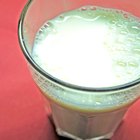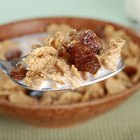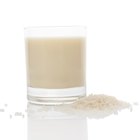
Whether it's a dry face or body, skin in need of gentle and nutritive effects can benefit from milk protein. While it is rich in protein because of its complete amino acid content, milk protein is also non-irritating; this makes it an excellent option for people with particularly dry or sensitive skin.
Milk Protein Benefits in Skin Care
Hydrolized milk protein, which is the common form of milk protein in skin-care products, is classified as being very low in toxin hazards by Environmental Working Group. Milk protein in this form is obtained by either enzyme, acid or hydrolysis and becomes a hydrolysate of milk protein, allowing for maximum absorption. Milk protein is a common ingredient in cleansers, moisturizers, and bath products such as shower gels and soaps. It is also beneficial in products formulated specifically to soothe irritated, dry skin, as it works to hydrate and lock in moisture. While this ingredient is commonly used by those with sensitive skin, many skin types can benefit from milk protein's nourishing and healing properties.
Related Articles
How to Scald Milk for Cooking

How Does Brewer's Yeast Benefit Skin?

Essential Enzymes for Hair Growth

How to Make a Cinnamon Milk Face Mask

Skin Care Products That Contain ...

Nutrition Information on Blueberries

Calories in a Bowl of Raisin Bran Cereal

Benefits of Shea Butter and Coconut Oil ...

Alkaline Diet & Protein Foods

Can Age Spots Be Reversed?

What Are the Ingredients in Proactiv?

Can You Tenderize Steak With Milk?

How to Cook Chicken Cutlets Without ...

Bodybuilding and Losing Fat With Skim ...

Milk of Magnesia Treatment for Acne

Rice Milk Nutrition Information

How to Remove Dry Skin on the Face

List of Retinoids
Nutrition Information for Onken Yogurt

How to Make Breading Stick to Meat ...
References
Writer Bio
Pamela Miller has been writing for health, beauty and animal health/welfare publications for seven years. Miller holds a Bachelor of Science in Organizational Communication from MTSU.
Photo Credits
Image Source/Digital Vision/Getty Images